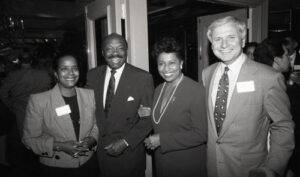It is my honor to say, “Meet Willie Brown: a timeless leader.”
Editor’s note: We asked Mike Roos, Member of the California State Assembly from 1977–1991, to write the Foreword to the Willie Brown oral history, which we are pleased to share with you below. Read the UC Berkeley Oral History Center’s oral history, Willie Brown: Mayor of San Francisco, 1996–2004. See more resources, including the oral history, commentary, videos, articles, notable quotes, and more.
by Mike Roos, Member of California State Assembly, 1977–1991
I first “met” Willie Brown in 1972. I was working in Lyndon Johnson’s War on Poverty office in Los Angeles.
Politics and public service were the constant objects of my attention. Watching the Democratic convention on television, I was suddenly riveted by the passionate and perfectly elocuted speech persuasively urging the seating of his California delegates. At close, the hall erupted in sustained and then thunderous applause. I never forgot his name and yearned our paths would cross one day. And they did.

In 1975, we met again. I was in the gallery of the California Assembly chambers when what proved to be the landmark Consenting Adults Bill was debated. Not much to my surprise, but certainly to my delight, the author, the same Willie Brown of 1972, rose to present the legislation. Without notes, he proceeded to spellbind the membership (and gallery), brilliantly arguing the law should focus on the consent of the adult for the sexual act, not the act itself. He won the day and California scored another progressive first with Governor Jerry Brown’s signature.
I personally met Willie Brown on the floor of the California State Assembly in June of 1977—as a colleague. I had just won a special election to fill a seat vacated by an incumbent to assume a federal appointment. I had now realized an ambition unthinkable as recently as a year earlier.
Now, here I was observing and participating in everything around me, but always with a keen eye on the work and moment of Willie Brown.
In those days, he was involved, yet detached from daily legislative life. He had lost a contentious contest for Speaker. The winner, Leo McCarthy, had publicly exiled him. Yet, the adage that the institution needs and requires its top talent led McCarthy to appoint him Chairman of the Revenue and Taxation Committee. Willie accepted with the caveat that he would faithfully chair his committee, attend floor sessions, but otherwise be in San Francisco.
Who knows, had a hostile contest for the speakership not erupted in 1979 between McCarthy’s majority Leader and McCarthy himself, Willie’s legend may have been written in the annals of famous trial lawyers: Think Johnny Cochran.
Nineteen seventy-five became a lesson in combative leadership for me and virtually every member of the Democratic caucus who had chosen to stand with McCarthy. Without formal title, Willie fluently became the instructor.
It was a revelation to watch him stealthily come into a caucus, move unassumingly to the back of the room, listen as the conversation moved gloomily to capitulation, and then, Willie, upon recognition, asking had anyone read the rules of the Assembly. Stunned looks transformed into cautious optimism as Willie, in measured tones, explained that a speaker could only be removed by forty-one votes. Everyone’s assumption had been that a majority vote by the Democratic caucus (which the majority leader had) would determine the outcome.
I devote time to this watershed event as it defines the moment for me and others what it meant to keep your head, while others were losing theirs.
This story ends well as McCarthy stepped aside after the November elections. Maxine Waters, Elihu Harris, and I persuaded Willie he could assume the mantle of the Speakership and prevail, which he did in a matter of thirty days prior to the scheduled vote.
And that brings us to a remarkable run as Speaker of the California Legislature. It is a remarkable record in which he addresses the AIDS epidemic, South African sanctions to confront and destroy apartheid, the first assault weapons ban, requirements to wear seatbelts, and on and on. Progressive legislation becoming models for the rest of the states.
Eventually, after holding the Speakership longer than anyone else in California history, he then left his beloved legislature to become an equally effective Mayor of San Francisco. It is all spellbinding in what follows.
My job here is to make a quick and brief introduction to the man.
What I really want to accomplish is to call out how special a public leader he was.
Someone once said in response to the question of how you define leadership, “You know it when you don’t have it.” I posit there is something primal in how we gravitate to people who we ultimately rely upon to lead.
It entails the rhythm of speech, the quality of laughter, the authenticity of personal caring and engagement, unpracticed intelligence, and kinetic energy. Willie Brown was blessed with, yet constantly developed these attributes through meticulous effort to become the most effective state leader in the later part of the twentieth century in the most influential state in the United States.
It is too easy and, again, fairly human to forget those of previous generations, but somehow you have been drawn to listen to him for some purpose.
I urge you to really get to know him through these masterful interviews. You are in for a unique ride with the most accomplished leader I have ever witnessed.
It is my honor to say, “Meet Willie Brown: a timeless leader.”